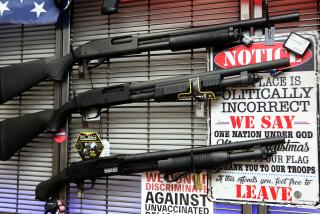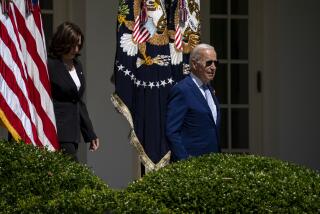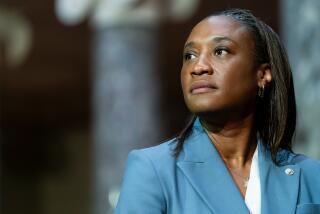Clinton May Back National Gun Licensing
- Share via
President Clinton said Saturday that he views the passage of the Brady bill as only the beginning of a much broader effort by his Administration to seek sweeping gun control measures, and noted that he is considering whether to push for a national gun licensing system.
In an interview session with editors and executives of The Times, Clinton said that he strongly supports a proposal by Sen. Dianne Feinstein (D-Calif.) to ban a wide array of assault weapons, and may also back proposals to prevent people from modifying legally obtained weapons so that they operate like machine guns.
Feinstein’s proposed ban is included in the Clinton crime bill, which will be considered by Congress early next year.
“The next thing that we ought to do is to pass a crime bill” with the assault weapon ban included, Clinton said. “If we an get a majority (in Congress) to vote on any reasonable version of banning assault weapons, then it seems to me that we will have crossed a significant divide in this debate. . . . Then I think we need to review the whole federal gun licensing operation. The permits are too inexpensive, (and) they’re indiscriminately issued and they override state and local law.”
In the wide-ranging session, Clinton also:
* Renewed his pledge not to seek a broad-based tax to fund his health care reform plan, despite mounting criticism in Congress that his current plans to pay for health reform don’t add up. He said that he might agree to congressional demands to phase in the financing of his plan more slowly than he has proposed.
* Predicted that he can convince the entertainment industry to voluntarily reduce the levels of violence in films and on television without forcing him to follow through on Atty. Gen. Janet Reno’s threat to impose new federal limits.
* Expressed concern that a global trade accord may not be reached in time to meet a Dec. 15 U.S. deadline. He warned that France must agree to settle its critical trade disputes with the United States a week before the Dec. 15 deadline to avoid a breakdown in the broader negotiations.
* Warned that tight budget constraints limit his ability to aid California’s faltering economy, and expressed frustration that some members of the California congressional delegation have voted to impose tougher spending limits at the same time that they are demanding that Clinton spend more money to aid California.
On gun control, Clinton said he is intrigued by an idea raised last week by New York City’s Republican Mayor-elect, Rudolph W. Giuliani, and supported by Los Angeles Mayor Richard Riordan, calling for either the federal government or the states to establish gun licensing and training systems for potential gun owners, similar to the licensing requirements states now have for motorists.
Clinton said he plans to ask the attorney general to study the idea.
“I think we ought to look at some sort of standards for ownership, just the way every state does with automobiles,” Clinton said. “I think that that really has some merit, and that’s probably the next place we ought to look. . . .
“I’m going to have the attorney general review, make a recommendation to me about it. . . . I’m just suggesting that it might be easier to have the national government say you have to have standards in these areas, some training programs or education programs or whatever and then let the state figure out how to do it.”
Clinton said that with passage of the Brady bill, which imposes a waiting period of five business days before handgun buyers can receive a weapon, the politics of gun control seem to have undergone a significant shift in favor of tougher measures. He noted that even lawmakers from rural states, including his home state of Arkansas, joined urban legislators to support the measure, the first major gun control legislation to make it through Congress since 1968.
Clinton said that he sees gun control and the broader issue of crime prevention as top priorities for his Administration.
“If we can’t restore the sense of basic physical security to people in their homes and on the streets and their schools and their workplaces, it’s going to be very difficult to have the American people have the proper state of mind to make all the changes we got to make to move toward the 21st Century.”
Clinton’s renewed pledge not to seek a broad-based tax to finance his health care reform plan comes just as Democratic leaders in Congress seem increasingly wary of endorsing the Administration’s financing plan. The White House health plan relies heavily on reaping savings from steep cuts in the rate of growth of Medicare and Medicaid as a way to avoid having to propose broader tax increases. The taxes in the current plan are limited to a 75 cents-per-pack cigarette tax and a levy on corporations that do not join the federally sponsored health system.
“All this skepticism about the financing, you know, is rooted in the conviction that America must always have the most expensive health care system in the world, and that it must be the most expensive for irrational, not rational reasons, and that any attempt to curb it is crazy.”
Clinton said his critics can’t believe that “we can fix what’s bad about the system, without hurting what’s good.”
Yet faced with mounting resistance on the issue, Clinton said that as long as Congress passes the basic legislation next year, he might agree to let Congress work out some of the details of the financing of health care reform in 1995.
Meanwhile, Clinton made it clear that he hopes to take advantage of his close ties to Hollywood to cajole the entertainment industry to tone down film and television violence before Washington has to take tougher action. In October, Atty. Gen. Reno warned that if the industry didn’t clean up its act, “government action will be imperative.”
He noted that when a society has a significant underclass of people who feel “dysfunctional” and alienated from the larger culture, then the people involved with developing the popular entertainment for the masses have a special responsibility. A “mindless assault on the basic institutions of the society is irresponsible” by film and television, he noted.
Still, Clinton, who spoke at a Democratic fund-raiser Saturday night at Creative Artists Agency, a powerful Hollywood institution, tried to strike a conciliatory note on film violence during the interview.
“You start with an outstretched hand, not with a clenched fist,” Clinton said. “Most people I know out here . . . really want to do something,” Clinton said. “And I think most of these folks are smart enough to know they can make a bunch of money without making the fabric of society weaker.”
He said that Reno was trying to “engage the American producers in entertainment--who are better at that than anybody on earth--in a constructive dialogue about how we can use these same forces to recreate the conditions of civilized behavior.”
But the main purpose of Clinton’s trip to Los Angeles was to highlight his Administration’s efforts to aid slumping California. Clinton clearly believes the state is critical both to the success of his domestic policies, as well as to his political future. The President met with aerospace workers Saturday at Rockwell International in Canoga Park, a day after his Administration unveiled $50 million in new defense conversion projects.
Clinton conceded that his California initiatives are inadequate to solve the state’s economic woes.
“No, it’s not enough money to do what needs to be done, but given the amount of money we have at the national level, California is doing very very well indeed,” Clinton said. But he suggested that many members of the California congressional delegation were hypocritical on the issue when they voted to impose even tougher spending limits on Clinton in late November at the same time they were asking for more aid.
The spending limit measure, which called for Clinton to cut an additional $90 billion from the budget over five years, failed in the House, but similar budget restraint measures, including a balanced budget amendment to the Constitution, are likely to come up early next year.
“A number of members of Congress from California voted for it because they thought that’s what their people back home wanted,” Clinton said, “(but it would have imposed) further defense conversion cuts, pretty much ended the prospect of health care reform and undermined our ability to invest more money in California.”
On foreign policy matters, Clinton conceded that he has made a series of errors. He singled out, as an example, allowing the humanitarian mission in Somalia to be transformed into a quasi-police effort to hunt down Somali warlord Mohammed Farah Adid. Yet in another regional conflict, Bosnia, he noted with a sigh, “What I don’t know is whether there is anything else I could have done to see our original policy prevail.” He hinted that he doesn’t foresee going beyond the Administration’s current policy on Bosnia in the near future.
“I think what we’ve done is about all we could have done there,” Clinton said.
Clinton also still seemed to be smarting from the public relations fiasco that stemmed from his infamous haircut on an earlier visit to Los Angeles. When asked how he feels the media is treating him today, Clinton said that he believes the press coverage of his Administration has improved in recent months. But Clinton said that early in his term the press seemed determined to make him look silly, and cited the airport haircut as an prime example.
“You know when I was out here (in May) and they made that totally bogus story about me delaying air flights and getting a $200 haircut, neither of which is true. The haircut was under $200, took 10 minutes and didn’t delay any air flights.”
* Q&A; WITH CLINTON: The President answers questions from Times editors. A38
More to Read
Sign up for Essential California
The most important California stories and recommendations in your inbox every morning.
You may occasionally receive promotional content from the Los Angeles Times.













